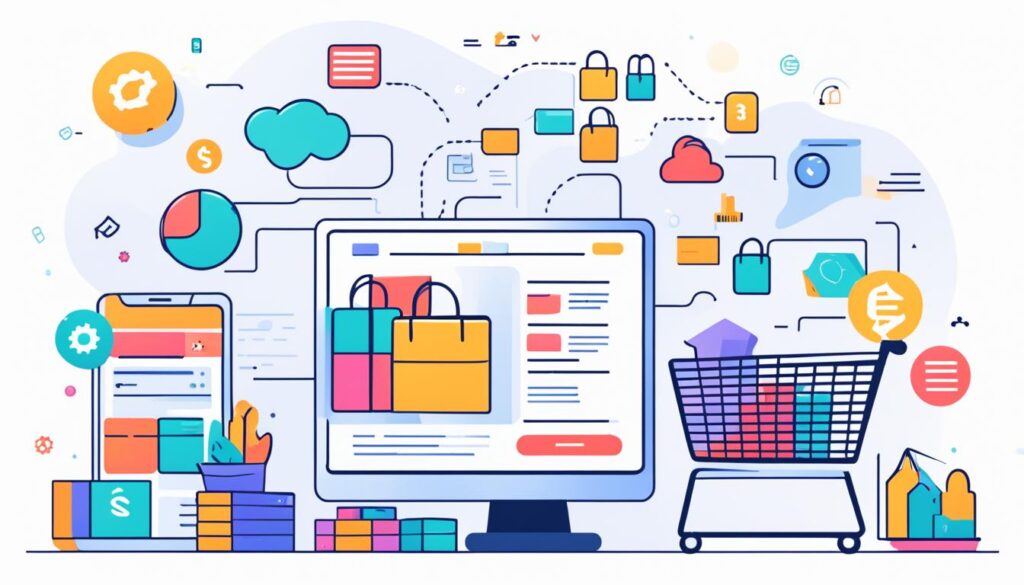Python3 in E-Commerce: Enhance Your Store!
Thursday, 6/6/2024, 8 minutes to read

Adding Python3 to e-commerce sites has changed online shopping for the better. Many GitHub projects show how Python3 is key in online stores, like one that’s similar to Amazon and has over 223 stars. This indicates trust from the community in Python3 for online sales.
By using tools like Selenium for getting data from websites and special scripts, Python3 is quite useful for developers. It’s also good at managing money through custom payment systems.
These projects point out Python3’s strengths and its popularity in creating good, safe, and effective online shops. They also make it clear that Python3 is about more than just business. It’s also about smart and easy-to-use solutions for people who shop online.
Key Takeaways
- Python3 applications in e-commerce are widely showcased in popular GitHub repositories.
- Projects like Amazon clones highlight the community’s trust in Python3 for e-commerce solutions.
- Middleware integrations with Python3 tools, such as Selenium, provide practical benefits for developers.
- Custom payment APIs demonstrate Python3’s versatility in handling financial transactions.
- Python3 helps create scalable, secure, and efficient online retail platforms.
Introduction to Python3 in E-Commerce
Python3 is known as an advanced language great for e-commerce websites. It’s ranked as one of the top ten most used languages since 2003. Now, it stands as the fourth most popular according to the TIOBE Index. Companies like Google and Facebook use Python3 for their websites.
What is Python3?
Python3 was released on January 7, 2016. It’s an updated version of Python made to be simple and clear. It’s top on the list for people learning to program, especially by Google searches. Python3 carries the best parts of past versions. This makes it great for big projects like e-commerce sites.
Why Choose Python3 for E-Commerce?
Choosing Python3 for online shops brings big benefits. It’s especially good for projects like a Django e-commerce store. This project lets you do many things, like picking items and paying for them. Python3 makes these kinds of projects much easier to do.
Python3 is also used in ERP systems and business tools like Odoo. In 2018, it was the technology most professionals wanted to learn. According to StackOverflow, Python is the seventh most popular language for developers. People who know Python work on important e-commerce tech jobs like data analysis and software development.
In short, using Python3 in e-commerce is a wise choice. It’s easy, popular, and full of great tools. This makes it perfect for creating effective online stores.
Leveraging Python3 for Online Retail
Using Python3 for e-commerce brings many advantages. It makes development fast and secure. It also makes maintenance easy. With Python3, creating powerful online shops is a breeze.
E-Commerce Development with Python3
Python3 is key in developing e-commerce websites. It’s known for its flexibility and big community support. By using Python3, building online stores becomes simple and efficient.
Python3 comes with helpful built-in tools. These include functions like print() and len(). They make operations smoother.

With Python3, you can reuse code easily. This helps keep e-commerce sites updateable and ready to grow. You can add new functions smoothly thanks to import statements.
The from … import statement is a great example. It simplifies how you use functions from other files. This means less hassle when coding.
Python3 Tools and Frameworks for E-Commerce
Django is a top Python3 framework for big e-commerce projects. It’s great for managing large online shops. Other tools like Shuup, Saleor, and Oscar also stand out for their unique features.
- Shuup: Perfect for creating online marketplaces with multiple sellers.
- Saleor: Offers fast performance and beautiful design. Ideal for active online shops.
- Oscar: Especially good for shops selling different kinds of products. It allows a lot of customization.
These Python3 tools make e-commerce development smooth and scalable. They help businesses cater to their customers’ diverse needs. And they keep online shops secure and flexible.
Python stands out because of its straightforwardness and vast library. Plus, you can easily add more features using external modules. This makes Python3 a key tool for creating modern online shops.
Building an E-Commerce Website with Python3
Using Python3 to make an e-commerce site has big pluses. You get a strong system and can handle growth easily. It’s also great for making the site focus on users. I’m going to walk you through the process. Plus, I’ll show you examples to make things clearer.
Step-by-Step Guide
Let’s go through making an e-commerce website with Python3 step by step:
- Team Formation: Create a team with different skills. You’ll need people who know Python3, Django, design, and managing databases.
- Topic Selection: Choose what your site will do. You should decide how products will be shown, how users will pick them, and how to keep everything safe.
- Project Synopsis: Give a summary of your project. Talk about your methods, models, and diagrams for how the site will work.
- Requirement Gathering: Write down all the details you need. Think about what the site will do and what it needs to work well.
- Coding or Implementation: Start building with Django. Make things like Categories, Customers, Products, and Orders.
- Testing: Check everything thoroughly. Test stuff like signing up, looking at products, ordering, and managing those orders.
- Project Presentation: Finish up with a detailed report and a presentation. Show how you met your goals.

Case Studies and Practical Examples
Here are some cases that show Python3 in e-commerce is powerful:
- Amazon Clone: A version of Amazon made with Django. It proves Python3 is good for safe shopping and user experience.
- Middleware Integrations: Using Selenium, one made analyzing data easier. It made the e-commerce solution stronger.
- Custom Payment APIs: For secure payments, Python3 is handy. It makes handling money online safe and efficient.
Below is a chart showing different parts and what they need in a Django e-commerce site:
| Model | Fields |
|---|---|
| Category | Name (max length: 50 characters) |
| Customer | First name, last name, phone, email, password |
| Product | Name, price, category, description, image |
| Order | Product, customer, quantity, address, phone, date, status |
Python3 and its powerful tools make building an online store easier. It helps both the creators and the users.
Conclusion
Python3 is changing the e-commerce game. It brings powerful tools, making store development and operation smooth. Using frameworks like Django, businesses can quickly and securely launch their products.
Python3 isn’t just for building stores. It has a big impact on digital marketing too. Tools like pandas and matplotlib help with automation and data analysis. Big names like Instagram and Spotify trust Python for their services.
Learning Python3 is easy thanks to its strong support community. It gels well with other languages and fits many industries. E-commerce firms choosing Python3 for both development and marketing can find a winning edge.
FAQ
What is Python3?
Python3 is a powerful programming language. It’s often used for making software. This includes things like building e-commerce websites. It’s known for being easy to read and for having a strong community that helps out.
Why choose Python3 for e-commerce?
In the e-commerce world, Python3 shines. It’s great for making websites that are safe and run well. Python3 and its Django framework make it quick to build and easy to update your online store.
How do I get started with e-commerce development using Python3?
To start, learn about Python3 and Django. You should get how ER diagrams work and how to manage files. There are many guides and tutorials online to help guide you in the right direction.
Python3 and Django are used together a lot. They make it easy to start and keep up an online shop. Knowing about ER diagrams and managing your files is important. Don’t worry, there are lots of guides and tutorials online to help you.
What are some popular Python3 frameworks for e-commerce?
Django, Flask, and Pyramid are well-known frameworks in the Python3 world. They help build strong, safe, and scalable online stores. These are the building blocks for your e-commerce site.
Can Python3 be integrated with existing e-commerce platforms?
Yes, you can add Python3 to existing online stores. It works great with tools like Selenium and custom payment systems. This shows how flexible and powerful Python3 can be in the e-commerce scene.
What tools are recommended for building an e-commerce website with Python3?
For making your online store with Python3, tools such as Django, Shuup, and others are perfect. They help with everything from managing products to safely handling payments. These tools are key for a successful e-commerce project.
Are there any practical examples of e-commerce development using Python3?
Yes, you can find many live examples on GitHub. These range from Amazon-like projects to virtual stores made with Django. They show how Python3 is used for both shopping and managing the store.
How secure is Python3 for handling e-commerce transactions?
Python3 is very secure, especially with Django. It’s made with strong safety features for the web. Adding custom payment systems makes your online store even safer.
Can Python3 handle large-scale e-commerce development?
Absolutely, Python3 is great for big e-commerce projects. Programs like Django take care of the hard stuff so your website runs smoothly. They are built to support huge online stores without slowing down.
Where can I find Python3 e-commerce projects to learn from?
Github is a great place to start learning. Look for projects with a lot of community feedback. These could be big projects or ones showing how to use special payment systems. They’re a great way to see Python3 in action for e-commerce.
Other blog posts
Revolutionize your business with cutting-edge technology!
Let’s Bring Your Vision to Life—Contact Us Today!
📝 Get an Estimate